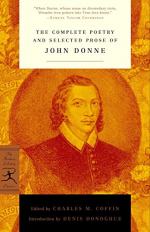|
This section contains 412 words (approx. 2 pages at 400 words per page) |

|
To Sir Henry Wotton Summary & Study Guide Description
To Sir Henry Wotton Summary & Study Guide includes comprehensive information and analysis to help you understand the book. This study guide contains the following sections:
This detailed literature summary also contains Quotes and a Free Quiz on To Sir Henry Wotton by .
The following version of this poem was used to create this guide: Donne, John. "To Sir Henry Wotton." John Donne's Poetry (Norton, 2007).
Note that all parenthetical citations within the guide refer to the lines of the poem in which the quotation appears.
John Donne is perhaps the most well-known metaphysical poet of the early modern period, as well as the whole of English literature. He was born in London in 1572 to a Catholic family at a time when England was experiencing a tumultuous divide due to religion. England under Elizabeth I was officially Protestant, and as such Catholicism was widely criticized and its followers ostracized. When King James I succeeded Elizabeth I in 1603, Catholics anticipated more tolerant treatment due to the fact that James was the son of famed Catholic and would-be usurper to Elizabeth's throne, Mary, Queen of Scots. James maintained many of Elizabeth's policies toward religion, and as such the confusion and bias over Catholic versus Protestant practice continued. Donne, who had trained at Lincoln's Inn as a lawyer, eventually converted to Protestantism under James I and was named Dean of Saint Paul's in 1621.
Donne's poetry takes immense influence from his religious and intellectual background. His poems are often complex and feature extended metaphors called metaphysical conceits, as well as paradoxical images, concepts, and tones. Donne is also famous for conflating the language and imagery of erotic love with spirituality and the figure of Christ. One can observe a distinct shift in his poetry from his younger years as a lawyer – in which he trended more toward wit, eroticism, and seduction poetry – and his later work, much more concerned with concepts like mortality and one's relationship with God. Still, Donne's repertoire is known, on the whole, as a challenging and highly cerebral repertoire.
"To Sir Henry Wotton" is one of Donne's verse letters. Verse letters are epistolary poems often written to a close friend, political ally, patron, or confidant. This particular verse letter is believed to have been written in 1598, during a political conflict between Queen Elizabeth I and the Earl of Essex that threatened to destabilize the English government. The Earl of Essex (Robert Devereux) would go on to lead an unsuccessful rebellion against the queen in 1601, known now as the Essex Rebellion. In the poem, Donne reflects on the nature of ambitious men in the world of English politics, encouraging his friend Wotton to remain stealthy and undetectable in his dealings with the court.
Read more from the Study Guide
|
This section contains 412 words (approx. 2 pages at 400 words per page) |

|



